Amarillo City Council still at odds over provisions of an abortion ordinance
The Amarillo City Council continued its debate over an abortion ordinance in a three-hour work session with a full crowd in attendance Tuesday at the Amarillo Civic Center. This was the council's third meeting that has addressed taking anti-abortion measures to go beyond the state law, which is one of the most restrictive in the nation.
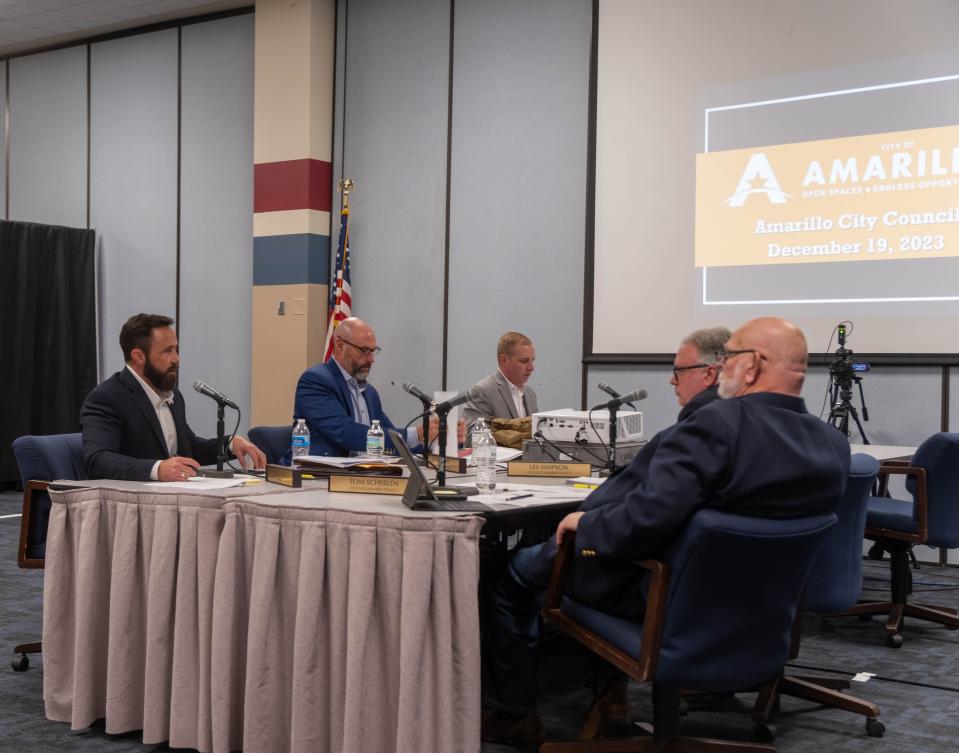
No public discussion was allowed at the special meeting, but the capacity crowd stayed for the duration. While the mayor and the council have said they want to look at concerns from all sides on this issue, much of the tone of Tuesday's meeting was set early on with Dr. Richard Bartlet, a staunch supporter of “Sanctuary City of the Unborn" ordinances, giving the invocation. This was then followed by a 45-minute presentation from anti-abortion doctor William Lile from Pensacola, Florida.
Lile has lobbied against the use of the mifepristone abortion pill, advocating that it creates serious health risks for women. This is not the consensus opinion among doctors or the U.S. Food and Drug Administration, which approved the drug in 2000. A report led by Dr. Elizabeth Raymond in 2013 using 87 different studies showed serious side effects requiring hospitalization only occurred in .003 percent of patients.
Lile shared a story about a woman who was carrying a baby who was likely to die and went full term with the baby. The baby died two hours after birth, but Lile says the woman and her family were grateful for the short time she had with the baby. Lile then made the argument that ending a pregnancy with a baby with a lethal condition was no more ethical or proper than ending a child's life after birth.
"Patients are told when they take the abortion pill they will have bleeding, cramping, and pain," Lile said. "What are the symptoms of an ectopic pregnancy? They are the same. So, women are being hurt by the abortion pill. One of the problems that many of us have is the risk. If they are not being supervised, there is a risk for the mom. 98% of the time, that baby is going to die. Well, do sometimes moms regret taking the abortion pill? Well, yes."
Lile spoke about the danger of occurrences of ectopic pregnancy with the abortion pill, which he says occurs in about 1 in 100 pregnancies. However, ectopic pregnancies can naturally happen outside of any use of medication due to various health issues, leading to complicated and life-threatening situations.
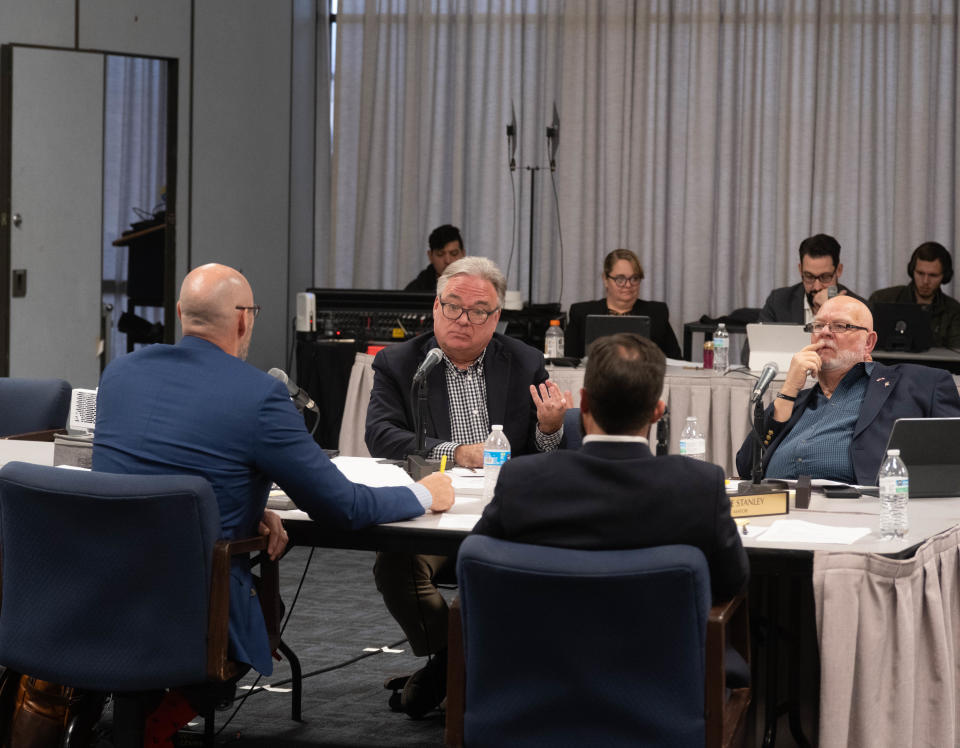
Lindsay London, a registered nurse and co-founder of the Amarillo Reproductive Freedom Alliance, said she was appalled that Lile was given a platform for 45 minutes with no other input from any local medical professionals.
“He was a grossly biased expert to utilize for the council to help make their decision,” London said. "If our city leadership is trying to say that they are listening to all sides of the issue, then in-turn forcing everyone to sit through a 45-minute pro-life presentation shocks and disappoints me. We were there to listen to our local leaders make the best decisions for our city and not have propaganda pushed by people without a relationship with our city.”
She said bringing in a biased outsider physician who had no interest in the community outside of promoting his extremist ideology was a disgrace to the process. Her group is going to request that the council talk to local doctors who serve the community rather than an anti-abortion lobbyist.
“There are always going to be exceptions or poor outcomes with any medication that is widely available, but it has been on the market for decades and has been statistically safer than Tylenol when talking about emergency room visits," she said. "So anytime someone is using that fear-based language around abortion pills, I have to really look at what their underlying agenda is.”
While she feels no ordinance is needed, London felt that of the discussed measures, she felt the one addressing unprescribed possession of abortion pills with no trafficking provision and proper disposal of fetal remains would be the most manageable and cause the least harm to citizens.
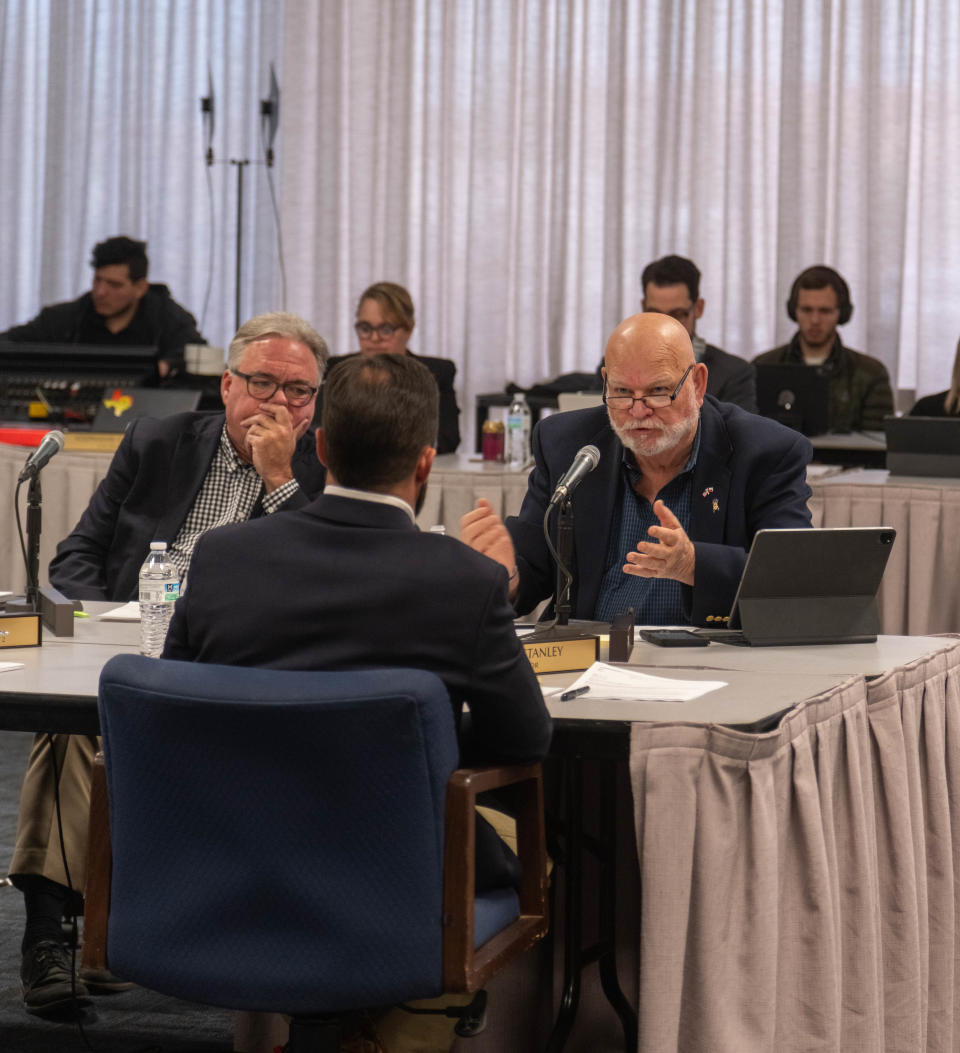
Council reviews 3 proposed ordinance drafts after doctor's presentation
Following the presentation, the city council discussed three possible drafts of the ordinances, each with progressive degrees of restrictions up to including private actions taken against anyone aiding a woman to get an abortion traveling through and from the city of Amarillo to a state where abortion is legal. Due to the high travel on interstates 40 and 27, Amarillo is seen as a key city for anti-abortion advocate Mark Lee Dickson, who has been part of the effort to create “Sanctuary Cities for the Unborn” in more than 40 cities in Texas, most of which are close to the border and smaller cities. If Amarillo were to join the list, it would be the second largest city in Texas to adopt this type of ordinance behind Lubbock.
These sanctuary city ordinances seek to discourage such travel using private enforcement, which allows private citizens to sue individuals who aid in the transport to get an abortion.
During the meeting, councilmembers Josh Craft and Don Tipps expressed the need for an ordinance to protect life, seeming to favor more regulations on travel and usage of the abortion drug. Tom Scherlen was vehemently opposed to any level of overreach from the city council that he says would infringe on the rights of Texans and is above what state law already prohibits.
Councilman Les Simpson suggested that with all the talk that tied this to human trafficking, the city might want to focus more on an ordinance to address that issue rather than some of the more extreme aspects of the abortion ordinance.
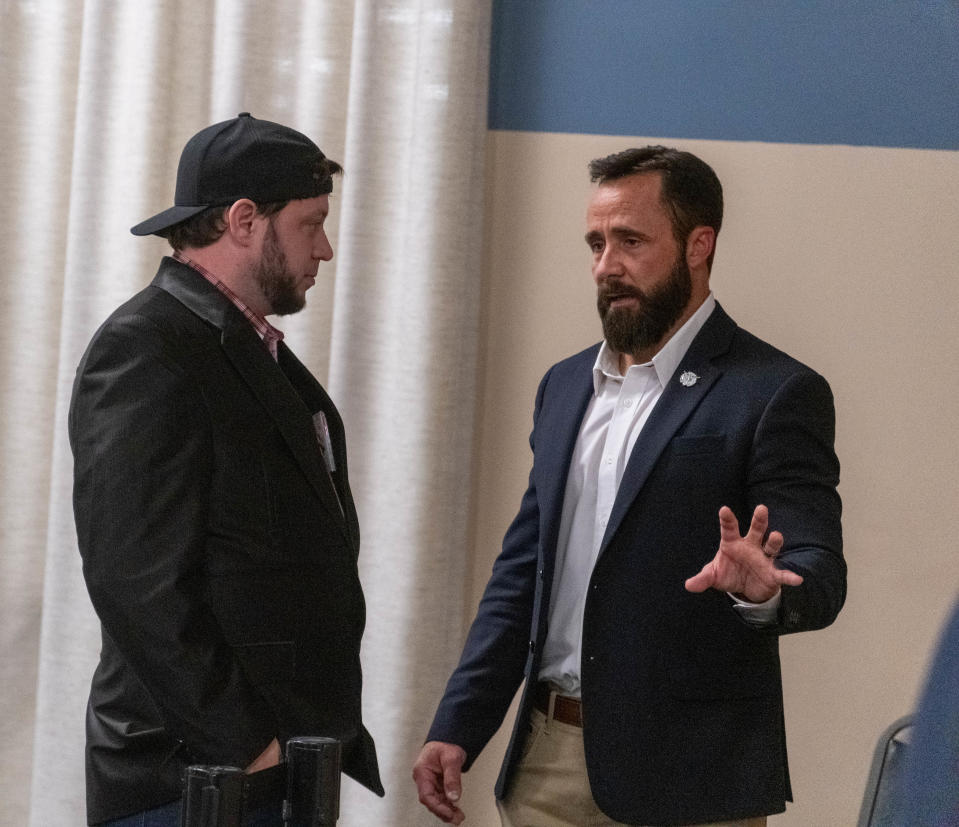
Mayor Cole Stanley said during the meeting that this would be a chance for the city to break down what an ordinance would mean to the city in its role and duty to protect life. He said the council would do what makes the most sense for the city without overreaching the role of city government.
The idea that seemed to get the most consensus among council members was public action that would make it illegal to have the abortion pill without a prescription from a doctor. Also, part of that ordinance would be a restriction on the disposal of fetal remains. Tipps and Craft favor some level of private enforcement for abortion within the ordinance.
Questions about the term 'trafficking' raised
Following the meeting, Dickson spoke about his impressions of the special session. He said he was bothered by inaccuracies that he felt were stated in the meeting, especially about the term "trafficking".
“This is far from over, of course; there is much more work to be done,” Dickson said. "Simpson talked about how if someone is being trafficked, they are going against their will. A common myth about trafficking is that the person is always unwilling. According to a Health and Human Services website, victims of trafficking can be willing participants and still be considered trafficked.”
The U.S. Department of Human Services, on its website, says that victims can be forced, defrauded, or coerced into trafficking. Even if victims initially offer consent, that consent is rendered meaningless by the actions of the traffickers to exploit them for labor, services, or commercial sex.
Dickson praised Craft and Tipps' support for their stances on the ordinance regarding trafficking.
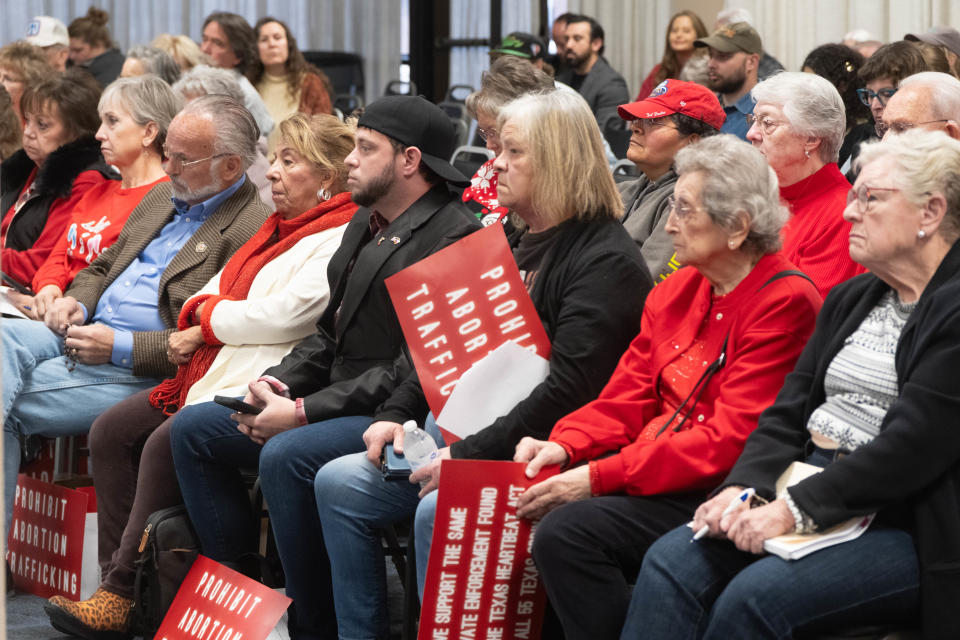
“They brought it back to what this is all about, being a 'Sanctuary City for the Unborn,'" Dickson said. “What about the unborn child? The unborn child is the one being murdered and trafficked against their will.”
When asked if either of the first two proposals were to be passed as an ordinance would be amenable to his group's mission, Dickson said neither of these measures prohibits abortion.
“Can we say these would be ordinances that outlaw abortion?” he said. "No, they are not; they cover areas around the edges."
A private right of action on drugs without prescription, protection of life
Stanley said the council will work with staff to help orchestrate a draft that works for all members. He said that any ordinance put forward will not have any travel restrictions but would create a private right of action that could be enforced by civil suit.
"Today, what we got to see was a true representative form of government,” Stanley said. “We need to enforce some laws that pertain to how physicians can prescribe drugs that are medical needs and how our population can get their hands on drugs that are not intended for this purpose without medical guidance.”
When asked about the optics of having an anti-abortion doctor who practices more than 1,000 miles away in another state address the council as the only medical representative making a presentation to council members, Stanley responded it was a means for a path ahead in the process.
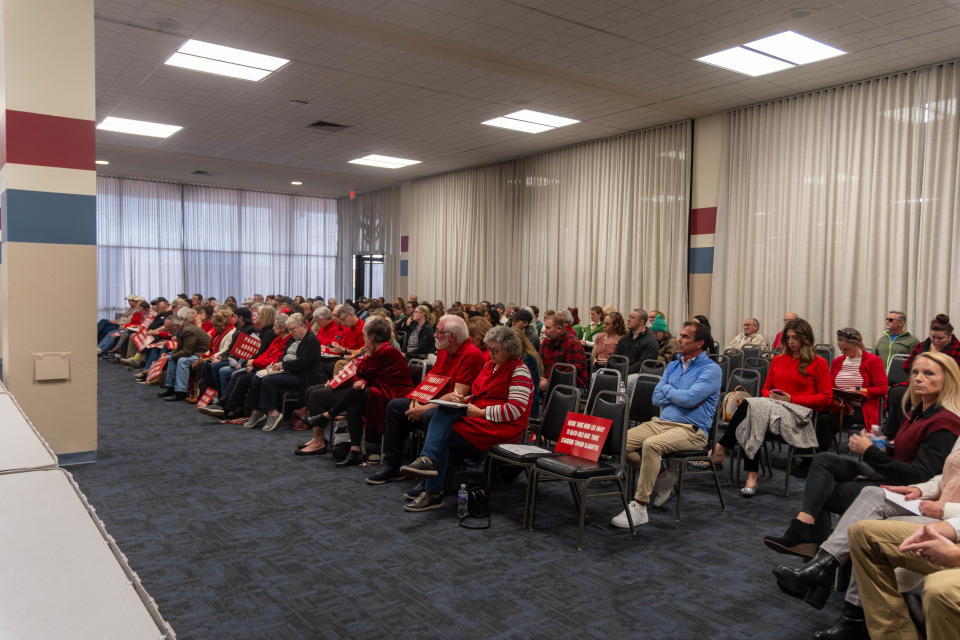
“It is unreasonable to say that you can have five people that all told you from the beginning that they are pro-life, but they are going to approach this with no bias,” Stanley said. “I think you need to have a reason to know why you believe what you believe. So, bringing a pro-life doctor in to talk about the medical side of RU486 (mifepristone) but also all the medical interventions that they do inside of the womb set the tone for what I was hopeful to accomplish today, which was a path forward, not an argument backward. We have had plenty of time for everybody else to tell us what they think. It is not one-sided, but my job is to look at the protection of life, liberty and property.”
He said that if all one watched was today’s meeting, he could understand the criticism, but he stressed that the council had given hours of conversation to the topic. According to Stanley, there was no need to bring in multiple subject matter experts, which is common when items are up for council discussion. One difference in this setting with this expert was that those in opposition to his opinion were not given more than 40 minutes to make their case, but rather three minutes allotted in public hearings.
Stanley said that he chose this doctor from Florida rather than a local doctor due to the polarizing nature of the debate. He said that limiting the discussion to one expert was more productive for the council to be educated on the abortion drug, and he was not interested in showing residents that he was listening to both sides but rather wanted to bring a doctor forward who could show the medical advances that we have on operating on babies inside the womb.
“Today, what you heard was different, and it is biased, and I own that,” Stanley said. “I do not think it is a problem to bring in a subject matter expert who is biased. Every other meeting you have sat through with any previous mayor, they did not bring in two consultants to tell you why you should get a new civic center.”
Council members weigh in on possible 'government overreach,' unintended consequences
Scherlen addressed his concerns about overreach from any proposed ordinance and felt that the first two proposals had the most promise for him depending on the enforcement mechanisms and needs in the community.
“The biggest thing I saw with the abortion trafficking language is I do not believe in government overreach,” he said. “When we start telling people what they can and cannot do, it can become a problem. I want something that will last the ages rather than an ill-conceived hasty ordinance.”
He expressed concern that any ordinance would possibly duplicate or go beyond state law, which he felt was unnecessary and not the role of the city government. Getting back to what he felt was the primary role of the city council is a priority for Scherlen, rather than getting bogged down on this issue. On the ordinance, he felt it would have been helpful to hear from other doctors since Lile's views are hardly the consensus among the medical community.
“When you are looking at serving a whole community, you have to look at all sides of an issue,” Scherlen said. “We have an exceptionally good state law with one of the strictest abortion laws in the country. At the end of the day, I will have to see the document in front of me to decide how to vote. A lot of the stuff I did not like was when they were talking about transportation. I felt that overstepped the constitution, which trumps everything.”
Councilman Simpson was actively engaged in the meeting with questions regarding the abortion pill and the impact of a proposed abortion ordinance. He said that he understood concern from many residents that the presentation may have seemed biased but said that it would not have much influence on his ordinance stances.
“When looking at these issues, to me, the important thing is to make sure that an ordinance does what it sets out to do,” Simpson said. “For me, it's important that an ordinance has the intended consequences we want to have. ... We want to ensure we do not write it so broad that it does not have negative unintended consequences.”
Simpson said his greatest concern with the ordinance is trying to enforce an abortion travel ban through a city ordinance.
“We will continue to look at this, but one thing is let's come to a consensus, whatever that is, and get it done because we have a lot of other things to look at that are important to the city,” Simpson added. “I would ask of any ordinance if there were already a state law why do we need to do something locally.”
James Schenck, a regular city council attendee, said he appreciated the council's work toward a quality conclusion for the community. He said he was not a fan of the measure to have civil action for abortion travel.
“Turning neighbor against neighbor is not a good approach," Schenck added.
The Amarillo City Council will continue to discuss this issue through the city message board to hash out details of a possible ordinance proposed in January if a consensus is reached.
This article originally appeared on Amarillo Globe-News: Amarillo City Council to continue crafting abortion ordinance

